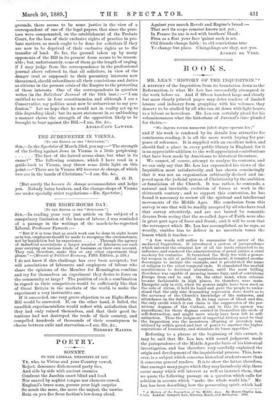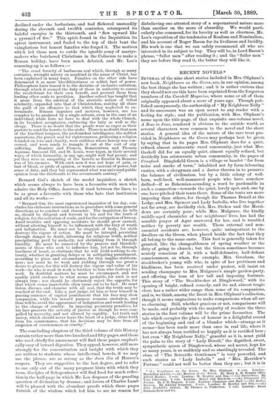BOOKS.
MR. LEA'S " HISTORY OF THE INQUISITION."* A HISTORY of the Inquisition from its foundation down to the
Reformation, is what Mr. Lea has successfully attempted in the work before us. And if fifteen hundred large and closely but most clearly printed pages may deter readers of limited leisure and industry from grappling with his volumes, they deserve to be studied by all who can sit down with light hearts to a labour so herculean. Mr. Lea can certainly plead for his voluminousness what the historians of Juvenal's time pleaded for theirs,—
" Sic ingens rerum numerus jubet atque operum lox ;" and if his work is rendered by its details less attractive for continuous reading, it is all the more worth buying for pur- poses of reference. It is supplied with an excellent index, and should find a place in every public library in England, for it is an appreciable addition to the well-appreciated contributions
that have been made by Americans to historical literature. We cannot, of course, attempt to analyse its contents, and we can only say that Mr. Lea has expounded his views of the Inquisition most satisfactorily, and has shown convincingly that it was not an organisation arbitrarily devised and im- posed upon the judicial system of Christianity by the ambition or fanaticism of the Church. It was rather, he contends, a natural and inevitable evolution of forces at work in the thirteenth century ; and to support this contention, he has found it necessary to review all the spiritual and intellectual movements of the Middle Ages. His conclusion from this survey is one that will be readily accepted by all who have read that survey attentively, and are not barred by romantic dreams from seeing that the so-called Ages of Faith were also in great part ages of force and fraud ; and it will be seen that the retrospect which Mr. Lea has accomplished, as he says, so wearily, enables him to deliver in no uncertain tones the lesson which it teaches :—
"A few words will suffice to summarise the career of the mediaeval Inquisition. It introduced a system of jurisprudence which infected the criminal law of all the lands subjected to its influence, and rendered the administration of penal justice a cruel mockery for centuries. It furnished the Holy See with a power- ful weapon in aid of political aggrandisement, it tempted secular Sovereigns to imitate the example, and it prostituted the name of religion to the vilest temporal ends. It stimulated the morbid sensitiveness to doctrinal aberration, until the most trifling dissidence was capable of arousing insane fury, and of convulsing Europe from end to end. On the other hand, when atheism became fashionable in high places, its thunders were mute. Energetic only in evil, when its powers might have been used on the side of virtue, it held its hand and gave the people to under- stand that the only sins demanding repression were doubt as to the accuracy of the Church's knowledge of the unknown, and attendance on the Sabbath. In its long career of blood and fire, the only credit which it can claim is the suppression of the per- nicious dogmas of the Cathari, and in this its agency was superfluous, for those dogmas carried in themselves the seeds of self-destruction, and might more wisely have been left to self- extinction. Thus the judgment of impartial history must be that the Inquisition was the monstrous offspring of mistaken zeal, utilised by selfish greed and lust of power to smother the higher aspirations of humanity, and stimulate its baser appetites."
Referring to a phrase at the beginning of this extract, it may be said that Mr. Lea has, with sound judgment, made the jurisprudence of the Middle Ages the basis of his historical investigation, and has therefore very carefully explained the
origin and development of the inquisitorial process. This, how- ever, is a subject which concerns historical students more than it concerns general readers. It is to show the latter, therefore,
that amongst many pages which they may harmlessly skip, there occur many which will interest as well as instruct them, that we quote the following passage on a question which calls for solution in accents which " make the whole world kin." Mr. Lea has been describing how the persecuting spirit, which had
• A History of the Inquisition of the Middle Ages. By Henry Charles Lea. 3 role. London : Sampson Low, Marston, Bearle, and Itivington. 1888.
declined under the barbarians, and had flickered unsteadily during the eleventh and twelfth centuries, retempered its baleful energies in the thirteenth, and " flew upward like a pyramid of fire." This spirit found in the Inquisition its aptest instrument, and fooled to the top of their bent the vainglorious but honest fanatics who forged it. The motives which led these men to outdo the ignoble army of martyr- makers who butchered Christians in the Coliseum to make a Roman holiday, have been much debated, and Mr. Lea's summing-up is as follows :-
" The cruel ferocity of barbarous zeal which, through so many centuries, wrought misery on mankind in the name of Christ, has been explained in many ways. Fanatics on the other side have denounced it as mere bloodthirstiness or selfish lust of power. Philosophers have traced it to the doctrine of exclusive salvation, through which it seemed the duty of those in authority to coerce the recalcitrant for their own benefit, and prevent them from leading other souls to perdition. Another school has taught that it arose from the survival of the atavistic notion of tribal solidarity, expanded into that of Christendom, making all share the guilt of sin offensive to God which they neglected to ex- terminate. Human impulses and motives, however, are too complex to be analysed by a single solvent, even in the case of an individual, while here we have to deal with the whole Church, in its broadest acceptation, embracing the laity as well as the clergy. There is no doubt that the people were as eager as their pastors to send the heretic to the stake. There is no doubt that men of the kindliest tempers, the profoundest intelligence, the noblest aspirations, the purest zeal for righteousness, professing a religion founded on love and charity, were ruthless where heresy was con- cerned, and were ready to trample it out at the cost of any suffering. Dominic and Francis, Bonaventura, and Thomas Aquinas, Innocent III. and St. Louis, were types, in their several ways, of which humanity, in any age, might well feel proud ; and yet they were as unsparing of the heretic as Ezzelin da Romano was of his enemies. With such men it was not hope of gain, or lust of blood, or pride of opinion, or wanton exercise of power, but sense of duty, and they but represented what was universal public opinion from the thirteenth to the seventeenth century."
Bernard Gui's sketch of the model inquisitor, a sketch which seems always to have been a favourite with men who admire the Holy Office, deserves, if read between the lines, to be as great a favourite with those who hate that institution and all its works :—
" Bernard Gui, the most experienced inquisitor of his day, con- cludes his elaborate instructions as to procedure with some general directions as to conduct and character. The inquisitor, he tells us, should be diligent and fervent in his zeal for the truth of religion, for the salvation of souls, and for the extirpation of heresy. Amid troubles and opposing accidents he should grow earnest, without allowing himself to be influenced with the fury of wrath and indignation. He must not be sluggish of body, for sloth destroys the vigour of action. He must be intrepid, persisting through danger to death, labouring for religious truth, neither precipitating peril by audacity, nor shrinking from it through timidity. He must be unmoved by the prayers and blandish- ments of those who seek to influence him, yet not be, through hardness of heart, so obstinate that he will yield nothing to en- treaty, whether in granting delays or in mitigating punishment, according to place and circumstance, for this implies stubborn- ness ; nor must he be weak and yielding through too great a desire to please, for this will destroy the vigour and value of his work—he who is weak in work is brother to him who destroys his work. In doubtful matters he must be circumspect, and not readily yield credence to what seems probable, for such is not always true ; nor should he obstinately reject the opposite, for that which seems improbable often turns out to be fact. He must listen, discuss, and examine with all zeal, that the truth may be reached at the end. Like a just judge, let him so bear himself in passing sentence of capital punishment that his face may show compassion, while his inward purpose remains unshaken, and thus will he avoid the appearance of indignation and wrath leading to the charge of cruelty. In imposing pecuniary penalties, let his face preserve the severity of justice as though he were com- pelled by necessity, and not allured by cupidity. Let truth and mercy, which should never leave the heart of a judge, shine forth from his countenance, that his decisions may be free from all suspicion of covetousness or cruelty."
The concluding chapters of the third volume of this History contain rather more than two hundred and fifty pages, and those who read chiefly for amusement will find these pages emphati- cally easy of inward digestion. They appeal, however, still more strongly for the concentration and insight with which they are written to students whose intellectual bowels, if we may use the phrase, are as strong as the dura ilia of Horace's reapers. They are suggestive to the last degree, and to refer to one only out of the many pregnant hints with which they teem, disciples of Schopenhauer will find food for much reflec- tion in the half-page in which Mr. Lea disposes of the puzzling question of divination by dreams ; and lovers of Charles Lamb will be pleased with the abundant proofs which these pages furnish of the wisdom which led him to see no reason for disbelieving one attested story of a supernatural nature more than another on the score of absurdity. We would parti- cularly also commend, for its brevity as well as clearness, Mr. Lea's exposition of the tendencies of Realism and Nominalism, and his account of Roger Bacon for its liveliness and lucidity. His work is one that we can safely recommend all who are interested in its subject to buy. They will be, in Lord Bacon's phrase, " fuller men " after reading it ; and the "fuller men" they are before they read it, the better they will like it.



















































 Previous page
Previous page